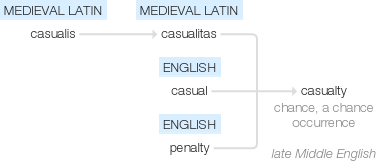Casualty
late Middle English (in the sense ‘chance, a chance occurrence’): from medieval Latin casualitas, from casualis (see casual), on the pattern of words such as penalty .
wiktionary
From casual, from Middle French casuel, from Medieval Latin casualitas and Late Latin cāsuālis(“happening by chance”), from Latin cāsus(“event”) (English case), from cadere(“to fall”) [1]. Originally meaning “a chance event” (compare casual, as in “casual encounter”), it developed a negative meaning as “an unfortunate event”, especially the loss of a person.
etymonline
casualty (n.)
early 15c., casuelte, caswelte, "chance, accident; incidental charge," from casual (adj.) on model of royalty, penalty, etc. From the earliest use especially of untoward events or misfortunes. Meaning "losses in numbers from a military or other troop" is from late 15c. Meaning "an individual killed, wounded, or lost in battle" is from 1844. Casuality had some currency 16c.-17c. in the sense "chance, a chance occurrence," especially an unfortunate one, but now is obsolete.
